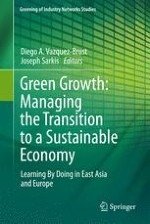2012 | OriginalPaper | Buchkapitel
13. The Diffusion of Green Technological Innovations and Stimulus: The Case of LUBEI Eco-Industrial Park in China
verfasst von : Li Guo
Erschienen in: Green Growth: Managing the Transition to a Sustainable Economy
Verlag: Springer Netherlands
Aktivieren Sie unsere intelligente Suche, um passende Fachinhalte oder Patente zu finden.
Wählen Sie Textabschnitte aus um mit Künstlicher Intelligenz passenden Patente zu finden. powered by
Markieren Sie Textabschnitte, um KI-gestützt weitere passende Inhalte zu finden. powered by
